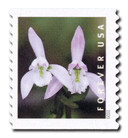
US #5439
2020 Triphora trianthophorus – Wild Orchids (Coil)
- Pictures the three birds orchid (with two blossoms)
- Part of the Wild Orchids set picturing nine orchid species native to the United States (one species shown twice)
Stamp Category: Definitive
Set: Wild Orchids
Value: 55¢ First Class Mail Rate (Forever)
First Day of Issue: February 21, 2020
First Day City: Coral Gables, Florida
Quantity Issued: 15,000,000 OR 50,000,000
Printed by: Banknote Corporation of America
Printing Method: Offset
Format: Coils of 3,000 OR Coils of 10,000
Perforations: Serpentine die cut 10 ¾ vertically
Tagging: Nonphosphored type III
Why the stamp was issued: To showcase the beauty and diversity of different species of wild orchids.
About the stamp design: Pictures a photograph by Jim Fowler of the three birds orchid (showing two blossoms), a species that grows wild in the United States.
First Day City: The First Day of Issue Ceremony was held in Coral Gables, Florida, home to the headquarters of the American Orchid Society.
About the Wild Orchids set: Includes 10 stamps picturing photographs by Jim Fowler of nine different orchids (one species shown twice) native to the United States. Species include: the three birds (pictured twice), California lady’s slipper, crested coralroot, showy lady’s slipper, marsh lady’s tresses, eastern prairie fringed, greater purple fringed, grass pink, and yellow cowhorn orchids. These are all beautiful wildflowers that most people don’t get the opportunity to see. They’re all hard to find today.
History the stamp represents: When most people think of orchids, they think of showy, brightly colored flowers from the tropics. In reality, orchids can be found growing wild in almost every climate around the world.
In the Americas, there is one species of orchid that grows only on the East Coast. Its scientific name is Triphora trianthophoros, but it is most commonly called the “three birds” orchid. This plant is quite small, standing less than one foot tall and producing flowers only about three quarters of an inch in size.
Triphora trianthophoros blooms vary in color depending on subspecies. Some are white, others blue, and still others produce multiple colored flowers on a single plant. The three birds orchid blooms from July to September, but each flower lasts only a few hours. The blossoms on the plant bloom at different times over the course of several days.
The three birds orchid is widespread from Panama in South America all the way north to Ontario, Canada. Despite this, it is rarely seen in much of its range. When there are sightings, it is usually among beech tree forests. The orchid is fairly easy to identify. Its blooms closely resemble the appearance of three birds in flight – the source of its common name. It’s amazing to think such a tiny flower can be so complex and beautiful.













